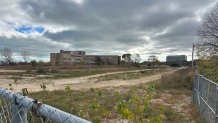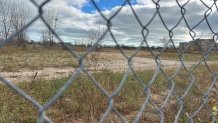It appears the Chicago Bears might be taking a step back from their proposed lakefront stadium and reconsidering another location for their massive new venue.
According to Crain's Chicago Business, sources familiar with the team's stadium discussions said officials are taking a second look at the former Michael Reese hospital site, despite having publicly written off the location.

While the talks are far from over and decisions are no closer to being made, the consideration of the alternate Chicago site marks the latest shift for the team following funding woes in Springfield.
"The people of Chicago will benefit from a project that's going to create 43,000 jobs in the region, 24,000 jobs for Chicagoans alone. A stadium that will be publicly owned and paid for by billionaires and visitors - that is the dynamic that we're faced with right now," Chicago Mayor Brandon Johnson said Tuesday. "The good news is ... I've said that my goal is to keep them in Chicago. And as long as we're clear about not just keeping them in Chicago, but creating opportunities for real economic development, that is important."
As of last month, the Bears remained focused on the city’s lakefront as the location for a nearly $5 billion stadium development project, team president Kevin Warren said at the time.
A proposal unveiled earlier this year calls for an enclosed stadium next door to their current home at Soldier Field as part of a major project that would transform the lakefront, but the Bears need public funding to help make it happen. The team also owns property in Arlington Heights, but Warren has maintained that the preference is to stay in Chicago.
Local
“That Museum Campus is fantastic, and especially with the backdrop of Chicago and the architecture of that city,” he said. “That remains our focus at this point in time.”
But the proposal hasn't been without its hiccups.
Feeling out of the loop? We'll catch you up on the Chicago news you need to know. Sign up for the weekly Chicago Catch-Up newsletter.
Shortly after the team first announced plans to stay in Chicago, Friends of the Parks, an advocacy group dedicated to maintaining open spaces and creating new parks in the city, which has been a vocal proponent of keeping private development off of the lakeshore, expressed "frustration" over the proposed site and urged the team to consider “other locations more suitable for development." Specifically, the group mentioned the former Michael Reese hospital site as a location the team should explore.
Here's what we know so far:
Where is the Michael Reese hospital site?
The former hospital in the Bronzeville neighborhood closed in 2008 and was purchased by the city of Chicago in 2009. The site is located just west of DuSable Lake Shore Drive, with close proximity to 31st Street Beach and other landmarks.
“The site potentially offers the best of both worlds – the development of a state-of-the-art stadium surrounded by a residential, business and entertainment district in a community steeped in rich, Black history,” Friends of the Parks said in a statement. “It also is accessible by bus, train, car, bike, scooter, and walking without disrupting the lakefront.”

The Reese hospital site is currently under development as a project called the “Bronzeville Lakefront,” which is slated to include thousands of residential units, senior housing and a medical research facility, according to Chicago officials.
Infrastructure work at the 48-acre site is expected to be completed by 2026 to add new sections of multiple Chicago streets, as well as dedicated green space, bike facilities and more.
Rep. Kam Buckner, who represents the area that includes both Soldier Field and the Reese site, said more discussions would need to be had on whether the site would fit what the Bears are trying to accomplish.
“I’ve said they have to adhere to the spirit of the Lakefront Protection Ordinance, and there’s a clear-cut difference between private development and public-private partnerships,” he told the Chicago Sun-Times earlier this year.
The provisions of the ordinance state that parks and the lake itself should only be “devoted only to public purposes and to ensure the integrity of and expand the quantity and quality of the lakefront parks.”
Where do things stand with the stadium project?
The Bears' plan calls for $3.2 billion for the new stadium plus $1.5 billion in infrastructure, potentially including a publicly owned hotel.
Warren last spoke about the stadium during the team's stay in London last month, reiterating the lakefront Chicago site as the main priority.
“The status is we’re continuing to make progress. We stay focused still to be able to be in the ground, start construction sometime in 2025,” Warren said. “We’re having regular meetings with key business leaders, key politicians, just staying focused and on course.
“This is a long journey. This takes time,” he added. “I've been there before. We're exactly where I thought we would be at this point in time.”
Warren, the team's president and CEO, was asked if the Chicago site is “imminent or inevitable” and he responded: “I don’t know (about) saying imminent or inevitable. I think it’s the best site as of now.”
The proposal calls for just over $2 billion from the Bears, $300 million from an NFL loan and $900 million in bonds from the Illinois Sports Facilities Authority.
The next step, Warren said, is to “get approval from a political standpoint.”
Representatives from numerous groups have voiced opposition to the lakefront location and state lawmakers have been lukewarm on the idea of approving such funding, with Illinois Gov. J.B. Pritzker and top leadership in both the House and Senate voicing concerns about the proposal.
Warren noted that the plans for a new building will be generic enough to fit more than one site, however.
“You want to build a stadium where it really becomes agnostic from a location standpoint, because it takes so much time from a planning standpoint,” he said.
In his previous leadership role with the Minnesota Vikings, Warren oversaw plans and development of U.S. Bank Stadium.
“Anything that's great in life, anything that lasts 50 years, takes a lot of energy and effort,” he said.
“I’m confident in the political leadership, the business leadership, our fan base, that we'll be able to figure this out,” he added. “It will become a crown jewel for the National Football League.”



